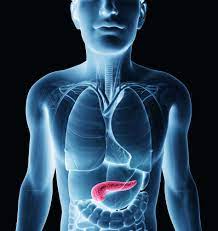Is Insulin Deficiency in Cystic Fibrosis Diabetes a Silent Crisis?
- admin
- September 28, 2024
- 9:02 am
- No Comments

When you think of cystic fibrosis (CF), your mind likely jumps to lung complications and digestive issues.
But did you know that diabetes is a frequent and severe complication for people with CF?
Cystic fibrosis-related diabetes (CFRD) is a unique and complex form of diabetes that significantly impacts the health and life expectancy of those with CF.
Insulin deficiency, a major characteristic of CFRD, is often overlooked, making it a silent but dangerous crisis in the CF community.
In this article, I shall delve into why insulin deficiency in cystic fibrosis diabetes is such a big deal and what this means for the management of this chronic condition.
“Insulin Deficiency in Cystic Fibrosis Diabetes” Article Index
- Understanding CFRD: The Basics
- The Role of Insulin Deficiency in Cystic Fibrosis Diabetes
- Why is CFRD Often Undiagnosed?
- CFRD Symptoms to Watch Out For
- CFRD Stage 2: What It Means for Life Expectancy
- How is CFRD Diagnosed?
- Managing CFRD: Insulin and Diet
- The Impact of CFRD on CF Endocrine Health
- Conclusion: Is Insulin Deficiency in CFRD a Silent Crisis?
Understanding CFRD: The Basics
Cystic fibrosis-related diabetes (CFRD) is the most common type of diabetes in people with cystic fibrosis, affecting up to 50% of adults over 30 years old.
Unlike type 1 and type 2 diabetes, CFRD is a unique condition influenced by both insulin deficiency and resistance.
The progressive damage to the pancreas caused by thick mucus in CF patients leads to a decreased ability to produce insulin, a hormone essential for regulating blood sugar levels.
The Role of Insulin Deficiency in Cystic Fibrosis Diabetes
Insulin deficiency is a core issue in CFRD, making it distinct from other forms of diabetes.
The damaged pancreas in CF patients cannot produce enough insulin to meet the body’s needs, particularly during periods of illness or increased metabolic demand.
This insulin deficiency leads to high blood sugar levels, which can cause severe health complications if not managed properly.
According to recent studies, insulin therapy is the primary treatment for CFRD, but many patients still struggle with effective blood sugar control due to the complexity of the condition.
Why is CFRD Often Undiagnosed?
Cystic fibrosis-related diabetes (CFRD) often remains undiagnosed for years—not because it is rare, but because it is sneaky. Its symptoms blend in too well with the typical chaos of cystic fibrosis, making it a master of disguise in clinical settings.
Here is why CFRD often slips under the diagnostic radar:
Symptom Overlap with CF:
Fatigue, weight loss, and reduced lung function can signal both CF progression and emerging diabetes. This symptom overlap causes healthcare providers to attribute changes to worsening CF rather than suspect CFRD.Standard Diabetes Tests Often Miss It:
Tests like A1c and fasting blood glucose—commonly used for diagnosing Type 2 diabetes—lack sensitivity in people with CF. Many CFRD cases present with normal fasting glucose and A1c below diagnostic thresholds.Inadequate Diagnostic Criteria:
The oral glucose tolerance test (OGTT) remains the gold standard, but its thresholds are based on non-CF populations. This delays diagnosis until hyperglycemia becomes more severe.Early Pancreatic Insufficiency:
In CF, pancreatic damage often starts early, affecting insulin-producing cells before glucose levels spike. Blood sugar may remain “normal” until insulin deficiency becomes significant.Rising Prevalence with Age
Although rare in children, CFRD affects up to 50% of adults with CF. Early signs can develop years before diagnosis, particularly if routine screening is skipped.Inconsistent Screening Practices
Despite guidelines recommending annual OGTT starting at age 10, many clinics don’t follow through consistently, especially in resource-limited settings.Healthcare Access Inequities
Underserved populations face delays in CF diagnosis and follow-up care, further postponing the detection of CFRD.
By understanding these pitfalls, clinicians can improve screening strategies and catch CFRD before complications escalate.

CFRD Symptoms to Watch Out For:
Recognizing the symptoms of CFRD is crucial for timely intervention. Key indicators include:
- Increased Thirst and Urination: High blood sugar levels can cause dehydration, leading to frequent urination and increased thirst.
- Unexplained Weight Loss: Despite adequate calorie intake, weight loss can occur due to the body’s inability to use glucose efficiently.
- Fatigue: Persistent tiredness can be a sign that the body is not getting enough energy from glucose.
- Worsening Lung Function: High blood sugar levels can promote bacterial growth in the lungs, exacerbating respiratory issues.
If you or a loved one has CF and experiences these symptoms, it’s important to consult with a healthcare provider for a proper CFRD diagnosis.
CFRD Stage 2: What It Means for Life Expectancy?
CFRD progresses through stages, with CFRD Stage 2 being a more advanced phase where insulin production is significantly impaired.
Studies have shown that CFRD can reduce life expectancy, particularly if it’s not managed well.
A 2020 study published in the Journal of Cystic Fibrosis found that people with CFRD have a 30% higher risk of mortality compared to those without diabetes.
This makes early diagnosis and management critical for improving outcomes.
How is CFRD Diagnosed?
CFRD diagnosis is a bit more complex than for other forms of diabetes.
Traditional methods like fasting blood glucose levels and HbA1c tests are used, but they do not always capture the unique blood sugar fluctuations seen in CF patients.
The oral glucose tolerance test (OGTT) is often recommended, as it can detect subtle abnormalities in blood sugar control that might not be apparent otherwise.
Once diagnosed, a comprehensive treatment plan that includes blood sugar support supplement and dietary modifications is essential.
Managing CFRD: Insulin and Diet
Managing CFRD requires a tailored approach that addresses both the insulin deficiency and the high caloric needs of CF patients.
Here is what you need to know:
1. Insulin Therapy:
Insulin is the cornerstone of CFRD management. Unlike type 2 diabetes, oral medications like metformin are not effective for CFRD due to the primary issue of insulin deficiency.
Adjusting insulin doses during illness or periods of high activity is also necessary to maintain blood sugar control.
2. CFRD Diet:
Nutrition plays a crucial role in managing cystic fibrosis diabetes mellitus.
A high-calorie, high-protein diet is often recommended to meet the increased energy needs of CF patients.
However, balancing this with the need to control blood sugar can be challenging.
Registered dietitians who specialize in CF can provide guidance on meal planning and carbohydrate counting to help manage blood sugar levels.
The Impact of CFRD on CF Endocrine Health
CFRD does not just affect blood sugar levels; it has broader implications for overall endocrine health.
The pancreas, which is responsible for insulin production, also plays a role in secreting digestive enzymes.
Damage to this organ can lead to a range of endocrine disorders, further complicating the health of CF patients.
Regular monitoring of endocrine function is essential for managing the complex interplay between CF and diabetes.
My Conclusive Analysis: Is Insulin Deficiency in CFRD a Silent Crisis?
Absolutely. Insulin deficiency in cystic fibrosis diabetes is often overlooked, but its impact is anything but minor.
It complicates an already challenging condition and significantly affects life expectancy if not managed properly.
The silent nature of this crisis—where symptoms are often mistaken for typical CF complications—makes it even more dangerous.
Early diagnosis, comprehensive management, and a proactive approach to treatment are crucial to improving the quality of life for those affected by CFRD.
Free Tip of the Day: Understanding and addressing insulin deficiency in cystic fibrosis diabetes is crucial for improving outcomes and quality of life for those living with this complex condition.
With the right support and treatment, it is possible to manage CFRD effectively and reduce its long-term impact.
References: